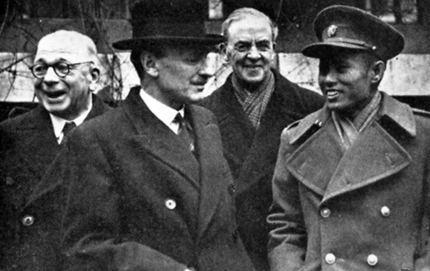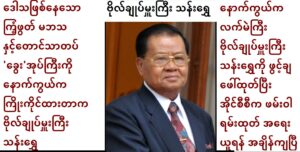Clement Attlee and Aung San at 10 Downing Street, January 1947 Credit Irrewaddy English.
Legal Commentary and Analysis by MMNN legal team:
Introduction
Successive military regimes in Myanmar have attempted, through retrospective laws such as the 1982 Citizenship Law, to strip away the citizenship and ethnic recognition of diverse Muslim communities across the country. These include not only the Rohingya but also long-established and historically recognized ethnic groups such as the Bamar Muslims, Pathis, Panthays (Myanmar Chinese Muslims), Pashus (Myanmar Malay Muslims), Myaedu, Kaman, Arakan Muslims, and Burmese-Indian Muslims.
While the plight of the Rohingya has received international attention and legal redress at ICJ and ICC, the broader spectrum of Myanmar Muslims continues to suffer in silence. This article outlines the illegality of such acts under both domestic historical frameworks and international legal instruments.
I. Historical Legal Foundations and Agreements
- Aung San–Atlee and Nu–Atlee Agreements (1947):
- These foundational agreements between Burmese independence leaders and the British government laid the legal groundwork for the independence of the Union of Burma.
- They recognized the rights of all indigenous people and long-settled communities within the territory, implicitly including all the Myanmar Muslim groups.
- Panglong Agreement (1947):
- Signed between General Aung San and ethnic leaders from the frontier areas, it guaranteed equal rights and autonomy to all ethnic nationalities joining the Union.
- While the document does not explicitly name each community, it formed the federal structure wherein historically rooted communities, including Muslims, were assumed to have full citizenship and equal rights.
- 1947 Constitution of Burma:
- Recognized citizenship rights for all indigenous groups and those long settled in Myanmar.
- Historical records confirm that Muslims served in top government roles: U Razak and U Rashid (Burmese-Indian Muslims), and Bamar Muslim U Khin Maung Latt and Rohingya Sultan Mahmood were ministers under U Aung San and U Nu, and U Razak was among the martyrs assassinated with Aung San on July 19, 1947.
- Groups such as the Pashus, Pathis, Panthays, Kaman, and others were listed among the 143 or 144 officially recognized ethnic groups.
II. International Legal Prohibitions Against Retroactive Denial of Citizenship
- Universal Declaration of Human Rights (UDHR), Article 15:
- “Everyone has the right to a nationality. No one shall be arbitrarily deprived of his nationality or denied the right to change his nationality.”
- International Covenant on Civil and Political Rights (ICCPR):
- Article 26: Prohibits discrimination on the basis of race, religion, or ethnic origin.
- Article 27: Protects minority rights to cultural, religious, and linguistic identity.
- Vienna Convention on the Law of Treaties:
- Prevents states from retroactively altering or withdrawing from treaty obligations that underpin statehood, citizenship, and group identity.
- Convention on the Reduction of Statelessness (1961):
- Myanmar’s mass deprivation of Muslim groups’ citizenship—rendering many stateless—violates both the letter and spirit of this convention.
- UNDRIP – UN Declaration on the Rights of Indigenous Peoples:
- Protects indigenous peoples’ right to their historical identity, traditions, and collective existence.
III. Customary International Law and the Rome Statute
- Rome Statute of the International Criminal Court (ICC):
- Article 7 defines widespread or systematic attacks against any civilian population, including persecution based on ethnicity or religion, as crimes against humanity.
- The Rohingya case is already under ICJ and ICC jurisdiction, but this legal basis applies equally to other Muslim minorities affected by discriminatory state policies.
- ICJ Jurisprudence and Non-Retroactivity Principle:
- Customary international law prohibits ex post facto laws, particularly those that affect acquired legal rights such as citizenship.
- Any attempt to remove citizenship rights retrospectively constitutes a violation of jus cogens norms (peremptory principles of international law).
IV. Ethnic and Historical Identity of Myanmar Muslims
- Pashus (Malay Muslims): Historically recognized, predominantly found in southern Myanmar.
- Pathis (Bamar Muslims): Indigenous Burmese Muslims integrated for centuries, speaking Burmese and practicing Islam.
- Panthays (Chinese Muslims): Migrated over centuries, mainly into Shan State, with commercial and cultural integration.
- Myaedu, Kaman, and others: Recognized historically and in official documents as ethnic groups with distinct cultural identities.
These groups were full participants in the independence struggle and state-building process. The fact that some of their leaders served in high office and had long-standing community structures is evidence of their legitimate place within Myanmar’s polity.
V. Conclusion and Legal Recommendations
Myanmar’s military and racially driven governments lack legal, historical, and moral authority to retroactively nullify the citizenship or ethnic recognition of Myanmar Muslims. Such acts violate multiple international legal instruments and foundational agreements upon which the Burmese state was built.
Recommendations:
- International Community Action:
- Expand the mandates of the ICC, ICJ, and UNHRC to investigate and prosecute retroactive laws targeting Muslims in Myanmar.
- Encourage UN recognition of all Myanmar Muslim groups beyond the Rohingya.
- Restoration of Legal Rights:
- Reinstate the ethnic and citizenship status of all affected Myanmar Muslims through international mediation and oversight.
- Education and Documentation:
- Promote scholarly and legal documentation of all Myanmar Muslim communities, ensuring accurate public records and education.
- Prevent Future Discrimination:
- Demand Myanmar’s alignment with international treaties such as ICCPR, UNDRIP, and the Statelessness Convention.
Myanmar Muslims are not outsiders. They are citizens, builders of the nation, and stewards of its cultural and historical legacy. Their rights must be restored, not revoked.






